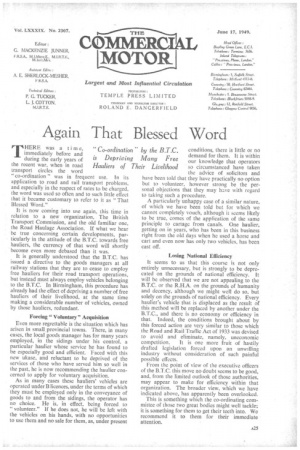Again That Blessed Word
Page 1

If you've noticed an error in this article please click here to report it so we can fix it.
"Co-ordination' by the B.T.C. is Depriving Many Free Hauliers of T heir Livelihood
THERE was a time, immediately before and during the early years of the recent war, when in road transport circles the word " co-ordination" was in frequent use. In its application to road and rail transport problems, and especially in the respect of rates to be charged, the word was used so often and to such little effect that it became customary to refer to it as "That Blessed Word."
It is now coming into use again, this time in relation to a new organization, The British Transport Commission, and the old familiar one, the Road Haulage Association. If what we hear be true concerning certain developments, particularly in the attitude of the B.T.C. towards free hauliers, the currency of that word will shortly become even more debased than it was.
It is generally understood that the B.T.C. has issued a directive to the goods managers at all railway stations that they are to ,cease to employ free hauliers for their road transport operations, but instead must always employ vehicles belonging to the B.T.C. In Birmingham, this procedure has already had the effect of depriving a number of free hauliers of their livelihood, at the same time making a considerable number of vehicles, owned by those hauliers, redundant.
Forcing "Voluntary" Acquisition Even more regrettable is the situation which has arisen in small, provincial towns. There, in many cases, the local goods manager has for many years employed, in the sidings under his control, a particular haulier whose service he has found to be especially good and efficient. Faced with this new ukase, and reluctant to be deprived of the services of those who have served him so well in the past, he is now recommending the haulier concerned to apply for voluntary acquisition.
As in many cases these hauliers' vehicles are operated under B licences, under the terms of which they must be employed only in the conveyance of goods to and from the sidings, the operator has no choice. He is, in effect, being forced to "volunteer." If he does not, he will be left with the vehicles on his hands, with no opportunities to use them and no sale for them, as, under present conditions, there is little or no demand for them. It is within our knowledge that operators so circumstanced have taken the advice of solicitors and have been told that they have practically, no option• but to volunteer, however strong be the personal objections that they may have with regard to taking such a procedure.
A particularly unhappy case of a similar nature, of which we have been told but for which we cannot completely vouch, although it seems likely to be true, comes of the application of the same principle to cartage from canals. One haulier, getting on in years, who has been in this business right from the old days when he used a horse and cart and even now has only two vehicles, has been cast off.
Losing National Efficiency It seems to us that this course is not only entirely unnecessary, but is strongly to be deprecated on the grounds of national efficiency. It will be observed that we are not appealing to the B.T.C. or the R.H.A. on the grounds of humanity and decency, although we might well do so, but solely on the grounds of national efficiency. Every haulier's vehicle that is displaced as the result of this method will be replaced by another under the B.T.C., and there is no economy or efficiency in that. Indeed, the conditions brought about by this forced action are very similar to those which the Road and Rail Traffic Act of 1933 was devised to avoid and eliminate, namely, uneconomic competition. It is one more fruit of hastily drafted legislation forced upon an unwilling industry without consideration of such painful possible effects.
From the point of view of the executive officers of the B.T.C. this move no doubt seems to be good, and, from the limited outlook of those authorities, may appear to make for efficiency within that organization. The broader view, which we have indicated above, has apparently been overlooked.
This is something which the co-ordinating committee of those two great bodies might well tackle; it is something for them to get their teeth into. We recommend it to them for their immediate attention.


























